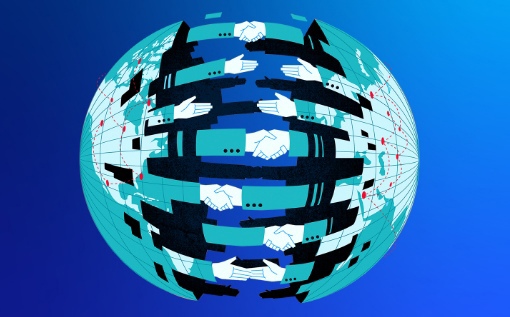Society must set itself on the path to peaceful coexistence and co-operation, to repair the social and economic damage of the past three decades, according to Social Europe.
Hyperglobalisation is no longer relevant. The commercial confrontation between the US and China, followed by war in Ukraine and, in October, the Middle East, has been exacerbated by ever-increasing inequality and wage stagnation, which has led to populist reactions in advanced economies and the rise to power of illiberal regimes in many developing countries.
Even the most vocal supporters of globalisation now argue that it has brought unfair benefits, and that the threats that became apparent during the pandemic and the collapse of supply chains do not justify lax regulation and low labour costs.
The outlook for the global economy has no clear horizon. In the United States, the Joe Biden administration is course correcting, seeking to ensure economic security at home while trying to maintain global supremacy. Many other countries are following the same approach and now see bilateral relations as essentially a zero-sum game. Geopolitical supremacy means that trade wars and economic sanctions can become a permanent feature of international trade and finance, Social Europe reports.
Multipolarity must be recognised and the goal of dominance abandoned in order to avoid a scenario that would make it impossible to mutually benefit from cooperation and provide global public goods of critical importance, such as peace within planetary boundaries and global health. It also requires repairing the social and economic damage caused by decades of market centralism under hyperglobalisation, restoring the spirit of the post-war Bretton Woods consensus and leaving more room for domestic goals.
According to American realists, the absence of a supranational body to establish order inevitably causes anarchy in the international system, forcing rational states to rely on themselves to achieve security. Thus, states realise their interests through the accumulation of relative, often material, power. In such a zero-sum environment, competition and conflict are natural and inevitable. In the words of John Mearsheimer, “the world is doomed to perpetual great power rivalry.”
US Treasury Secretary Janet Yellen recently enlisted the support of America’s allies to build more sustainable supply chains among trusted partners through “friendly shoring.” The administration is looking at gaps in domestic manufacturing and supply chains, including semiconductors, high-capacity batteries, and rare earth metals, that are dominated by (or through) foreign countries. These initiatives have raised fears of a rupture in the global economy, especially if the US and other advanced economies seek to avoid their developing country partners, according to Social Europe.
This concern is reinforced by a long list of measures adopted or under discussion, reflecting the determination of advanced economies to decide for themselves how to regulate trade between themselves and the rest of the world. This ever-growing list includes the fight over subsidies, the ban on trade in products derived from deforestation, the due diligence obligation imposed on European companies, the anti-coercion clause, the reciprocity instrument in public procurement, and the exceptional trade measures adopted in the face of pandemic and geopolitical tensions. The defence of domestic interests through trade policy and regulation by rich countries risked undermining the industrial sovereignty of developing countries.
However, ensuring national security in the absence of a global powerhouse is no guarantee that the world will be one of conflict and minimal economic interdependence. In the era of hyperglobalisation, most states failed to deal with the tension between national democracy and global markets – they ended up wrongly limiting democracy in the interests of minimising international transaction costs. We now need to restore the balance between the prerogatives of nation states and the demands of an open economy.
We have a difficult road ahead of us, as we need to expand the scope of national democratic politics and restore social contracts, while revitalising multilateral governance to address global emergencies. The starting point must be to prioritise the domestic agenda and stability. This is not contrary to an open economy, but rather is an integral part of it. To overcome mistrust and sustain multilateral co-operation, we must ensure that the benefits of production and trade are shared more equitably, and provide citizens with greater security and confidence in the face of change.
National democratic authorities should be given more power to regulate markets and influence market outcomes than was possible under the Bretton Woods regime. This includes looser rules on intellectual property, subsidies and standards, as well as giving national governments the freedom to choose regulations and tax regimes. Countries are different and at different levels of development. A pluralistic approach, based on recognising and respecting different political and economic systems, as well as different approaches to governance and industrial policy in different countries, is necessary to sustain social and economic progress.
